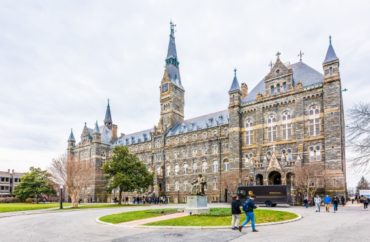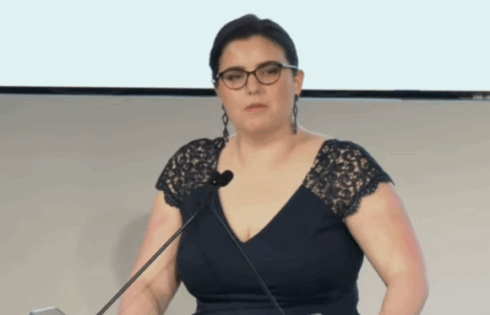
Georgetown University President John DeGioia announced that a controversial student referendum passed last April, which mandated student fees for a slavery reparations fund, will not be fully implemented.
Instead, the private university will shoulder the costs or come up with the funds through donations, philanthropy or other means unspecified in DeGioia’s message, sent via email last week to the campus community.
The student fee was expected to generate about $400,000 per year.
The university “will ensure that the initiative has resources commensurate with, or exceeding, the amount that would have been raised annually through the student fee,” DeGioia said in his email, noting that officials “embrace the spirit of this student proposal” — but offering a new plan without the fee and other original logistics.
Officials “will work with our Georgetown community to create an initiative that will support community-based projects with Descendant communities,” he wrote, adding those who wish to voluntarily contribute to the fund may do so.
The College Fix reached out Thursday to DeGioia’s office for comment and clarification, but received no reply.
Students who were against the fee included senior Hunter Estes, who told The College Fix on Sunday he supports the decision not to force students to pay into the fund.
“I believe reparations are inherently wrong and are an attempt to punish current generations for the sins of the past,” he said. “This rabbit hole is not one that should be pursued as it would never truly end.”
“However,” he added, “I applaud Georgetown’s decision to dismiss the concept that the school should force every student to pay into a system of reparations. While I believe Georgetown could spend its time and resources on better projects, such as finally fixing the crumbling infrastructure on campus, if an individual chooses voluntarily to pay into a reparations fund, then they are free to do so.”
Meanwhile, this development has apparently infuriated the referendum’s proponents. Flyers put up on campus last week declared the decision “delegitimatizes and undermines” the student vote.
The contentious measure sought to implement a semesterly fee of $27.20 on all undergrads. This recurring charge would have financed payments and projects for individuals identified as descendants of the 272 slaves Georgetown sold in 1838 to keep the school afloat.
The measure, which passed last spring with a 66 percent majority, called for the fee to begin to be collected in fall 2020. Only about 60 percent of the student body voted in the election, and some students had expressed fear in speaking out against the measure.
“In the days ahead, we will establish an advisory group that will develop a plan for launching this initiative and soliciting ideas for projects,” DeGioia’s letter stated, adding the group will include some students, but evidently not be controlled by the activists behind the referendum.
This stands in contrast to the wording of the referendum, which called for the fund to be managed by five GU undergraduate representatives and five representatives of the descendents of the GU272.
In their fyers denouncing the decision, GU272 proponents said the advisory group to be created by DeGioia and other campus leaders will have no clear structure, accountability measures or transparency.
Over the past few years, Georgetown has worked to reckon with its legacy of slavery. It officially apologized for the sale in April 2017. Campus officials also renamed two buildings named after the Jesuits involved in the sale, and created an African American Studies Department. The university also agreed to “offer an admissions edge to descendants of slaves as part of a comprehensive atonement” for the school’s past actions.
The views in this article do not represent those of the Department of Defense or the United States Army.
MORE: Why I voted ‘no’ on Georgetown’s slavery reparations plan
IMAGE: Anthony Blotkin / Shutterstock
Like The College Fix on Facebook / Follow us on Twitter






Please join the conversation about our stories on Facebook, Twitter, Instagram, Reddit, MeWe, Rumble, Gab, Minds and Gettr.